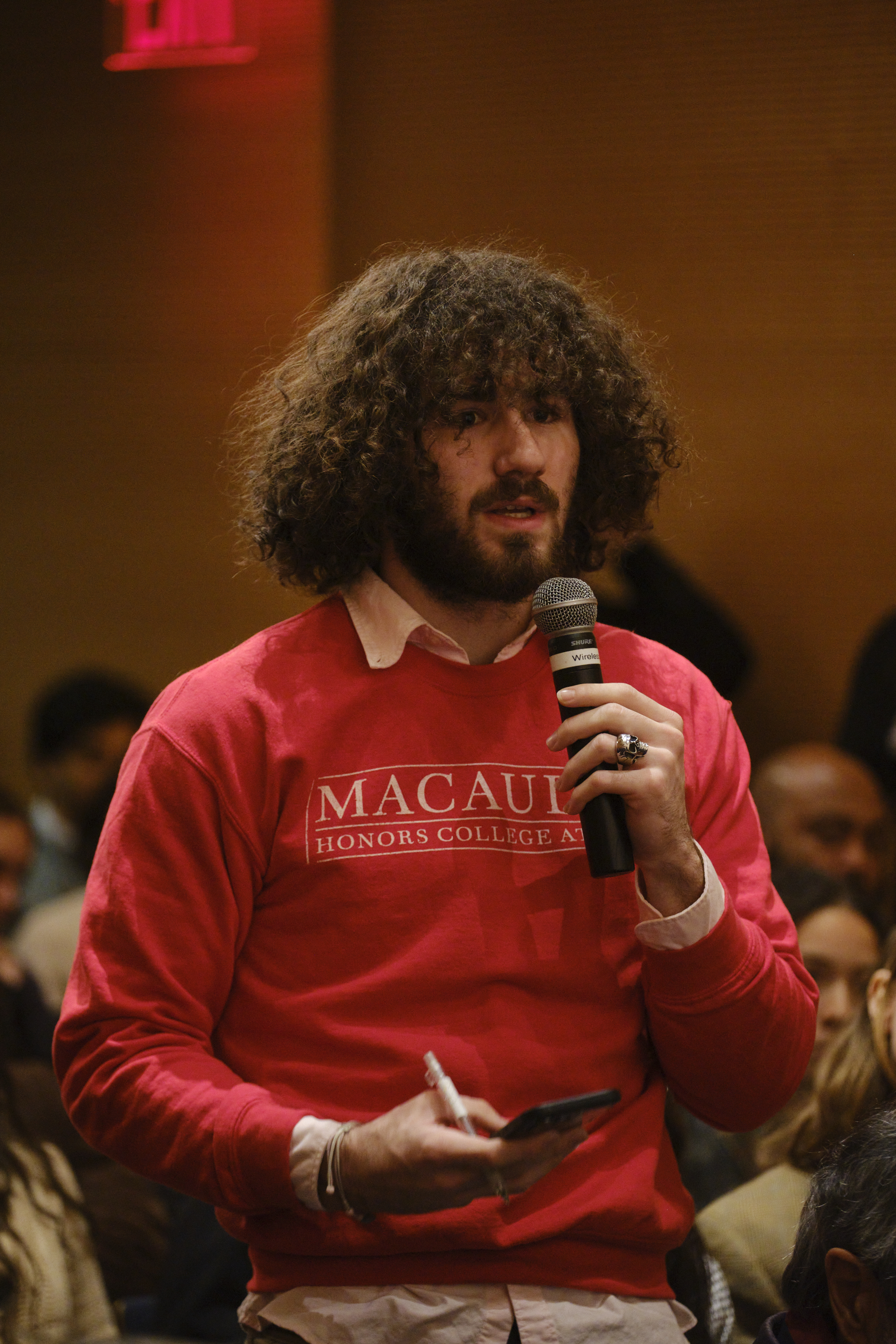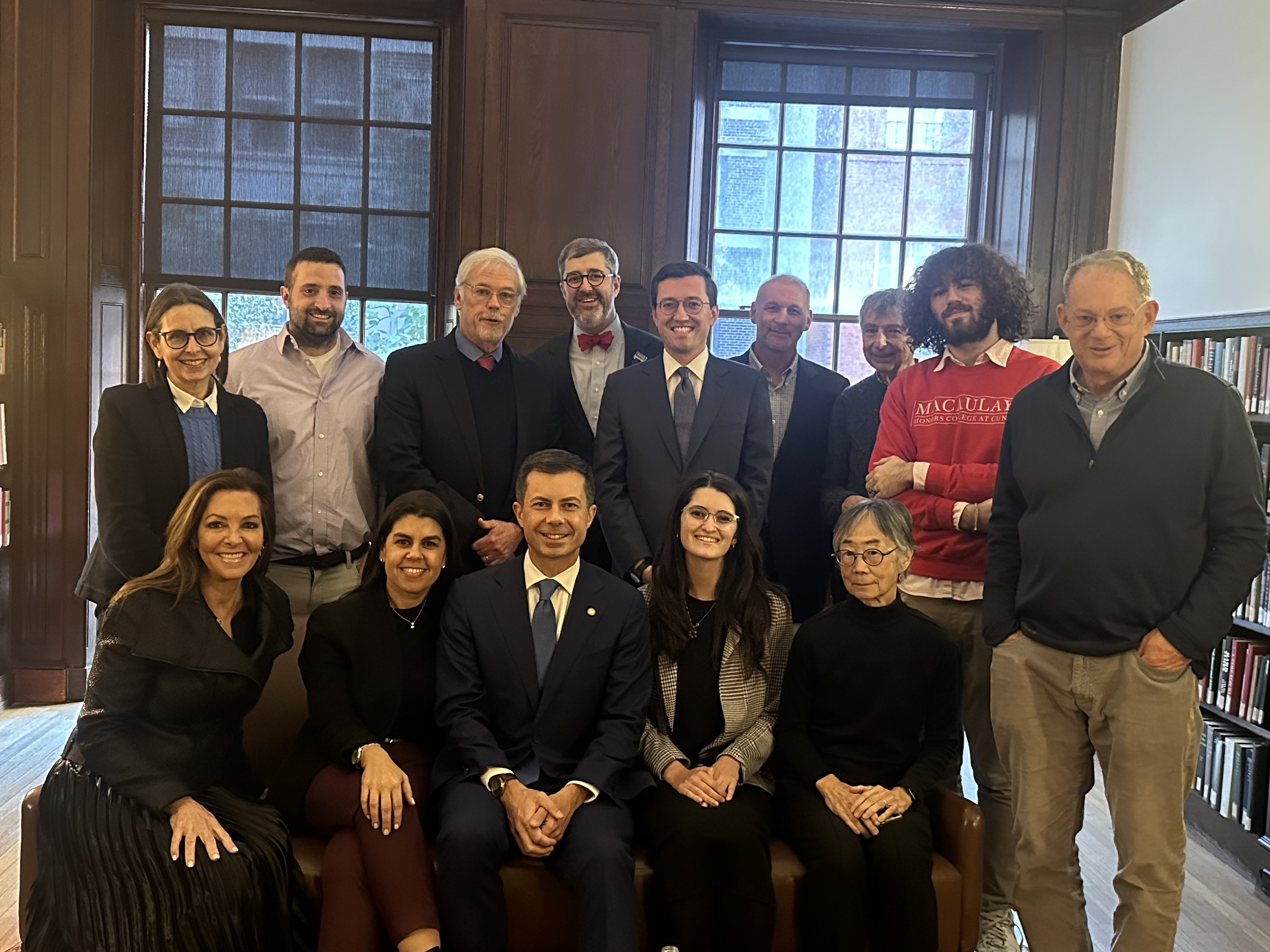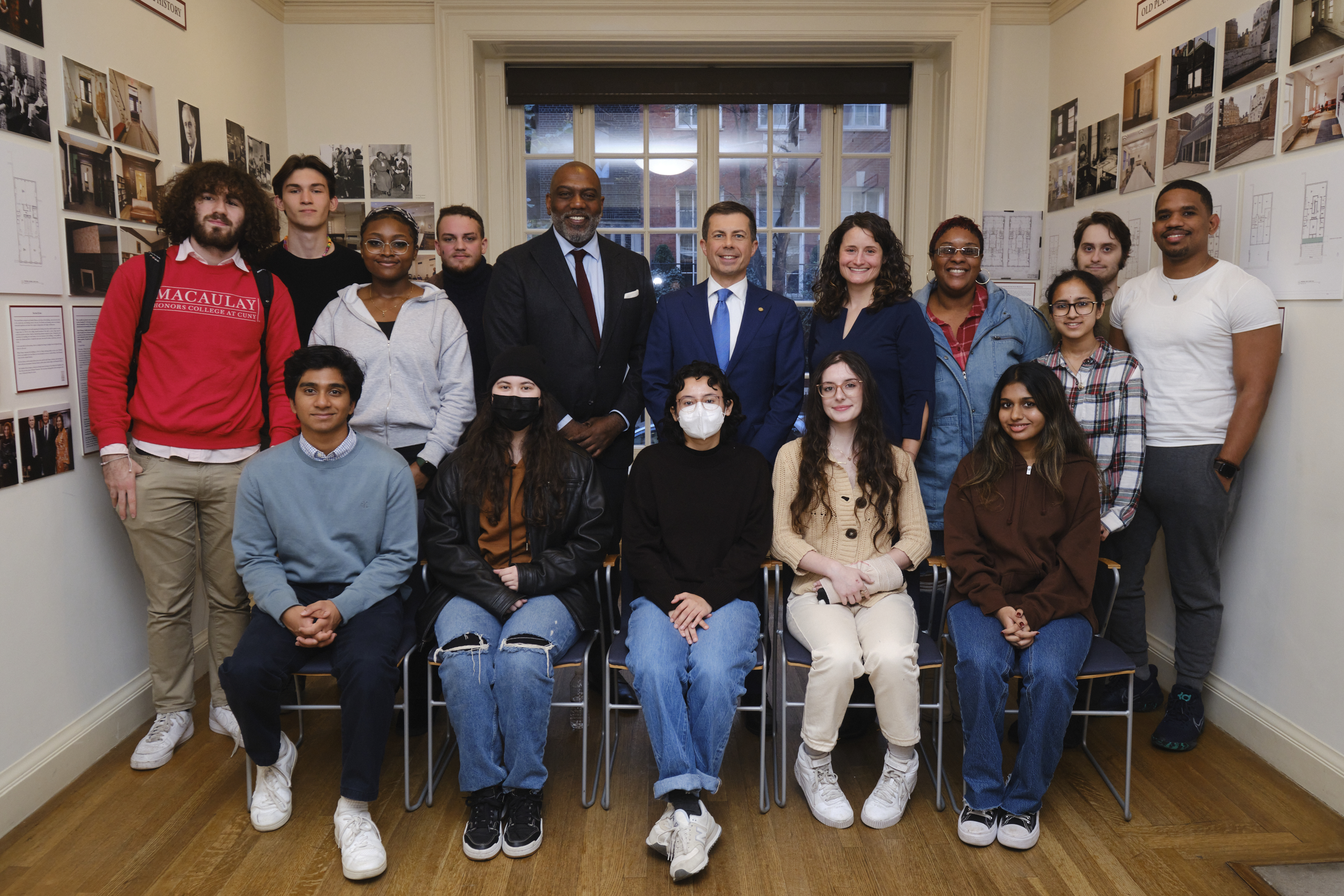Why don't you go back?
Pete Buttigieg: The Hopeful Secretary
On November 2nd, US Secretary of Transportation Pete Buttigieg shared his evolved perspectives on transit and street design at Hunter College's Roosevelt House for Public Policy, discussing promising solutions for sustainable transportation. See his thoughts on my question about federal funding equity in outer borough transit!
November 2, 2023: 10:00 AM, Brookdale Residence Hall, Manhattan:
While I usually don't get up this early for conferences anymore (relative to my 1 PM class schedule), for the sake of my sleep and mental health, this wasn't any ordinary conference. From the moment I got the email announcing it, I knew this was something special. Pete Buttigieg is having a conference on transportation at Hunter College! I threw myself into action to sign up for this meeting, and here I am, throwing myself into action to get ready for it two hours earlier than I would for class, with double the enthusiasm. I put on my first purposeful outfit of the semester, sweatshirt & button up collar, rings galore. It feels as though I only dress up for 30-something US politicians. Is this healthy? Does it make any sense? I can't answer that. All I know is that I need to look sharp to glare down the US Secretary in the eye and ask him why Queenslink or IBX isn't getting any federal money. It would be my mission. I run out the door, hop on my the CitiBike (paying a whole 10 credits to get an e-bike), and pedaled off to the Roosevelt House.
Pete Speaks
If I only had two words to describe what Secretary Buttigieg had to say on this day in conversation with Dr. Basil Smikle and Former Representative Steve Israel, it would be refreshingly progressive. One of the first few things he had to say as a response to the observation of young students moving away from car transportation was that true transportational freedom involves having greater options and choices for transportation, to have other options besides driving. Despite the fact that cars were all the rage when he was growing up, he has observed that there has in fact been a movement in the US to reject cars as the sole method of transportation, and that it would be better to provide greater choices.
For a position greatly associated with intensifying the status quo of car dependency in America, the Department of Transportation under Pete Buttigieg has undergone a great shift towards progressive views on public transit and walkability.
Buttigieg is, of course, an overall supporter of standard transportation improvement policy. His conversation revealed his support for greater funds for transportation, lamenting the loss of funds in the 2024 Transportation Appropriation Bill compared to the previous year. He highlighted the need for better climate resiliency for infrastructure in the face of events like the Seattle Light Rail shutdown due to sinking tracks and the I-70 mudslide, helping to pass dedicated resilience funding in the Infrastructure Investment & Jobs Act (2021). He put a high value on cooperation and community input (especially noting the issue of NYC congestion pricing), public awareness of the value transportation, and higher participation in the local processes involving it.
On top of these things though, Secretary Buttigeg is uniquely poised to solve the challenges of standard American planning practices by focusing on the non-car perspective. His understanding of how Americans, specifically those who live in cities, travel through their communities is impressively holistic, acknowledging that many of the commutes that people make are not for work, and that getting to the downtown of a city should not, and cannot be a transit agency's only goal, highlighting the great difficulty it is to get "crosstown", or between outer city neighborhoods.
Secretary Buttigieg, when asked a rather silly audience question pinning the blame of pedestrian road deaths on "inattentiveness", correctly reframed the question on the unique vulnerability of pedestrians and cyclists, who made up over a fifth of the 40,000 total road deaths in 2021, calling this high rate of deaths a "road death crisis". He later went on to point out that we as Americans tolerate carnage on our roads, and that this shouldn't be the cost of business, that this human cost of having streets and roads is not reasonable. In trying to reduce pedestrian road deaths, Buttigieg advocated for reducing vehicle speeds, reducing vehicle lane widths and reducing lane count, which he understands is safer for people, and eases traffic (great application of induced demand, but in the other direction!) I'm especially hopeful of this viewpoint expressed as policy, as this is just what he did in South Bend, Indiana, the city he served as mayor prior to the 2020 election.
Buttigieg, in discussing a sustainable future for transportation, correctly acknowledged that it's impossible to achieve full sustainability with just electric vehicles, and they alone cannot get the US to net zero transport emisisons. He understood the need for viable alternatives to driving at all for the possibility of net-zero emissions. The secretary is not only in support of high speed rail construction in America, but he also charmingly showed some reverence to other systems around the world, like Italy's Frecciarossa system, and Japan's Shinkansen system. He displayed interest in acquiring private funds for some capital projects, making an example out of Brightline, the South Florida regional rail line that was able to open with the help of private funding. At the same, he acknowledged that the funding given to Amtrak wasn't enough, and that it must be used for essential repairs and service restoration before putting it towards high speed rail projects.
The Transportation Secretary also had a staunchly pro-passenger rights position, in an issue that I didn't think of much myself. In a bold move, he criticized the monopoly on freight held by the 4 US class I railroads, sardonically asking if they would become "the next Coke and Pepsi[?]". Buttigieg lamented the lack of passenger protections from shady corporate tactics committed by air and rail companies, like surge pricing, refund refusal, and lower levels of customer service. Secretary Buttigieg made a claim that passenger rights are at record highs now, but I could not find evidence for this claim.
At last, my question. I asked Secretary Buttigieg why there was a gap in federal funding between NYC capital transit projects in the Central Business District of Manhattan (East Side Access, Second Avenue Subway, Hudson Tunnel Project), and in all other boroughs in the city. Queens, Brooklyn, and the Bronx are lacking in federal funds for essential projects, as Queenslink and the IBX remains unfunded by the federal government. Buttigieg, while acknowledging that outer borough "crosstown" transportation is essential to the well-being of working class communities, narrowly avoided the question by saying that the federal government doesn't come up with local transit plans, it simply funds them. He went on to say that the federal government and local government share funding responsibility. This, while technically true, avoids the concern I had, which was an explanation of or promise to mitigate the clear lack in equity of the federal government to make commitments to transit projects in the outer boroughs. Why is USDOT so quick to give billions to ESA, but not to IBX? This was my core concern, and it was, unfortunately, left unaddressed. I want to be optimistic and believe that Buttigieg was simply not in the position to make any commitments in the moment for any projects, but the existing inequity was at least acknowledged.
After Hours
After the conference, I had the chance to meet with Buttigieg in a different floor of the Roosevelt House. Despite my conflicts with him on the previous particular policy, I respected his position and his intentions enough to be starstruck when he walked into the room. I was especially flattered when he said he thought my question was very thoughtful :)
Here are the photos I got from the event!


